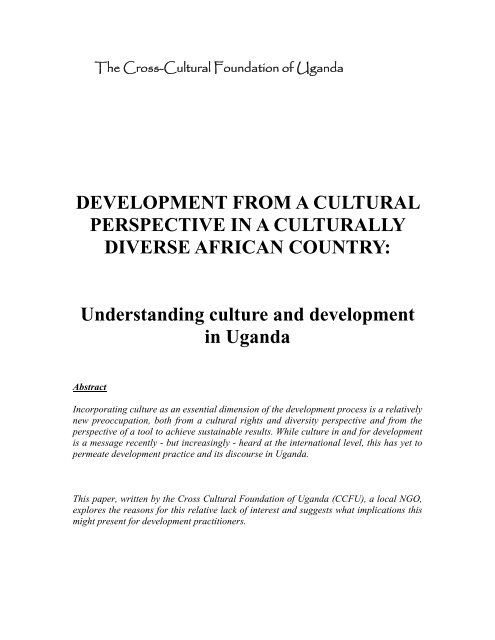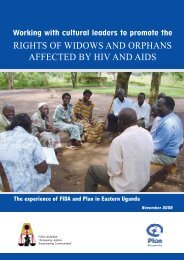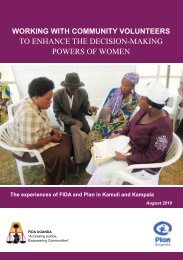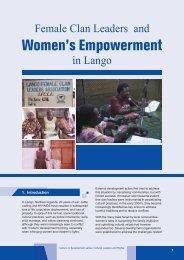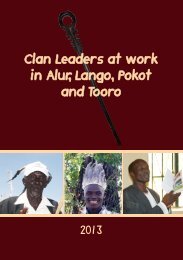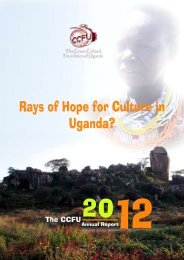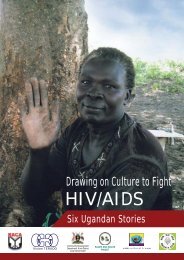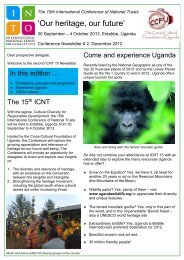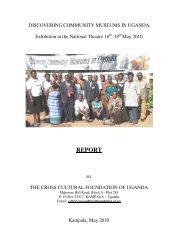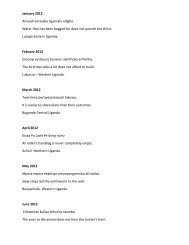Development from a cultural perspective - Cross-Cultural ...
Development from a cultural perspective - Cross-Cultural ...
Development from a cultural perspective - Cross-Cultural ...
You also want an ePaper? Increase the reach of your titles
YUMPU automatically turns print PDFs into web optimized ePapers that Google loves.
made to monetise the benefits of <strong>cultural</strong> industries, by itemising and calculating incomegenerated by <strong>cultural</strong> activities, creative <strong>cultural</strong> groups, <strong>cultural</strong> tourism, crafts, andart. Partly because of the current absence of such quantitative information, culture isgiven low priority.Four, is the legal framework. Some of the laws in force during the colonial era have notbeen revised, including banning local <strong>cultural</strong> practices that were branded aswitchcraft. This contributes to the negative perception that not only is the local cultureevil and primitive, but it is also unlawful. Some interest groups are however beginning toreview the relevance of existing laws and make amendments: performing artists have forinstance formed associations to ensure issues of intellectual property rights and copyrightare addressed.B. Culture and poverty and development policy – With more than a third of theUgandan population living in extreme poverty, creative energies are geared towardsmeeting basic needs such as food, medical care, shelter and security. Poverty is linked tovulnerability, including vulnerability to manipulation by internal and external forces.Developing <strong>cultural</strong> human potential through experimentation with local innovativethinking, science and technology is thus not given high priority, by both Government andthe population in general. Turning a blind eye to the implications of culture ondevelopment (population growth, environment management and protection, health (andspecifically HIV/AIDS), social discrimination (gender, age, disability), our respondentsargued, will only abet marginalisation of productive members of society and theircontribution to the nation.It was pointed out that that the significance of culture as an important factor in nationaldevelopment and politics has actually diminished in recent years. This is illustrated bythe ‘downgrading’ of the Ministry of Culture <strong>from</strong> a fully-fledged Ministry in the 1960s,to a Directorate under the Ministry of Gender, Labour and Social <strong>Development</strong> today.While efforts have been made to develop a national policy on culture, political will andresources are vital for its implementation. We have seen that culture is not significantlyreflected in the PEAP, nor is it mentioned substantively in the incumbent President’smanifesto. This lack of recognition has implications on sustained budget support forculture related programmes, although the Ministry is attempting to raise funds <strong>from</strong>sources other than Government to support various initiatives. Hosting the CommonwealthHeads of Governments Meeting (CHOGM) in Uganda in 2007 has also triggered a desirefor Uganda to showcase its culture in various creative ways, including organising aworkshop on culture in development. The sustainability of such action is however yet tobe verified.The education policy previously encouraged crisscrossing of students <strong>from</strong> differentregions to gain exposure and learning <strong>from</strong> districts other than their own, in a bid tofoster mutual tolerance and respect. The opposite happens nowadays, with students andpublic servants selected and posted to their districts of origin. As a result, individuals
have a narrow worldview, often prejudiced and biased against other ethnic groups, infavour of a narrower ethnic allegiance.Nevertheless, education is one sector where a deliberate effort has been made toincorporate culture in development, with the recent introduction of selected locallanguages as media of instructions in primary schools. At higher levels of education,however, there is limited use of indigenous knowledge. Traditional medicine, forinstance, is not given much consideration in the training curriculum of doctors and henceoften dismissed. While little has been done to utilise education to advance oral traditionand indigenous knowledge, the new policy on using local languages as media ofinstruction in lower primary school classes may nevertheless provide an entry point to reintroducethese in a manner that is relevant to the current context and that will serve as apoint of reference for future generations.Language is an important mode of communication through which culture is transmittedand developed. A society can be unified or divided by it. Our respondents felt thatUganda suffers <strong>from</strong> the lack of national language(s); domination of certain languages aswell as the use of language to discriminate against others (e.g. using derogative terms toundermine the dignity of marginalised groups) sometimes causes division. Yet attemptsto introduce Kiswahili as a national language have met resistance, in part because it is notindigenous and is therefore perceived as another imposition, in addition to English.While using local languages in primary schools is likely to lead to the development ofliterature for educational and entertainment purposes, some parents have been opposed tothis new policy, as formal education and the written word in English are still generallyglorified. Similarly, an educational qualification, such as a PhD or Diploma, is considereda source of wisdom, while local oral culture is perceived as backward.In health care, we see signs that traditional healers and herbal medicine are increasinglyrecognized as effective alternatives to western-inspired services and medicine, includingin the provision of mental health care. Some traditional healers have formed associationsthat are supported by development organisations to establish herbal gardens, improve ontheir practice and implement income generating projects to serve their respectivecommunities. The Ministry of Health has set up a laboratory to research and test herbalprescriptions. A draft policy on the use of herbal medicine has been submitted to theMinistry of Health for consideration.The national investment policy was also mentioned: this is largely to the benefit offoreign investors who give little attention to the promotion of local products or culture.Thus Coca-Cola, bottled in Mbarara, a region that produces nutritious and cheap softdrinks (milk and obushera, a local millet drink), has out-competed the local products andyet has no nutritional value. Other investors, such as telecommunications companies, reapenormous profits <strong>from</strong> their operations, without making substantial contribution to thepromotion of Uganda’s culture.
oot causes of ethnic conflict; possible resolution mechanisms and how to establish newrelationships to address present day challenges.Despite these constraints, <strong>cultural</strong> leaders are still influential in determining communityresponses to change. There is therefore a growing (but still limited) trend by Governmentand other development organisations of involving <strong>cultural</strong> leaders as arbitrators in ethnicconflict and civil strife; in seeking alternative justice resolution; in tackling issues relatedto HIV/AIDS, orphan care, and girl child education. In addition, where <strong>cultural</strong> leadershave not been very active, a few individuals have taken the initiative to promote theirrespective local cultures by compiling information, collecting artefacts, conductingresearch, producing literature, initiating traditional music competitions, communitydrama, and sports.4. Implications for development practiceCCFU seeks to promote an understanding of development, as seen through ‘<strong>cultural</strong>lenses’, and reflecting our wealth of <strong>cultural</strong> diversity. The discussions held andexperiences shared by representatives <strong>from</strong> development organisations, local government,<strong>cultural</strong> institutions, religious institutions, traditional healers and individual promoters ofculture in development, as well as many challenges, do illustrate the existence ofdevelopment initiatives that have taken the positive aspects of culture into account. Theseare however often isolated and with limited reference to enabling policies. We thereforesee a need to:• Support <strong>cultural</strong> institutions and promoters to reflect upon and reconstructpositive aspects of traditional culture as a starting point of learning.• Support the creation of linkages and sustained learning mechanisms amongstvarious <strong>cultural</strong> initiatives and with other development institutions.• To the extent possible, solicit strategic and sustained support for <strong>cultural</strong>institutions <strong>from</strong> relevant ministries and other players in development processes.• Target <strong>cultural</strong> leaders in capacity building programmes to cause reflection andrepositioning of their role in development, while enhancing a more self-motivatedresponse to current development challenges.• Continue searching for good examples that clearly illustrate the significance ofculture in development work with the aim of improving development practice andgradually changing negative perceptions of culture in development, through(among others) new training curricula for development practitioners.Emily Drani, Executive Director,CCFU, August 2007.


